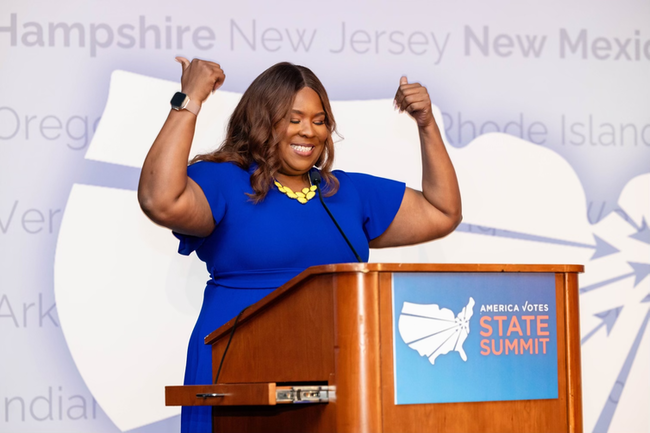YOU DON’T SAY
“The @NCSBE just begging to get sued again.”
Matt Mercer, the communications director for the NC GOP, on the State Board of Elections approving UNC’s digital student identification to be used as a valid form of voter ID this year. (WRAL News, 8/20/24)
Community Colleges
Hannah Vinueza McClellan, Education NC, 8/19/24
During this year’s short session, the N.C. Community College System (NCCCS) asked lawmakers for two requests: $100 million toward the new Propel NC funding model and $69 million for an enrollment growth adjustment to be distributed across the state’s 58 community colleges.
While budget proposals from both chambers included funding for the enrollment growth increase and the first phase of Propel NC, no compromise budget was passed before lawmakers adjourned the session. That means some colleges are facing large budget deficits for Fiscal Year 2024-25.
“We are advocating daily for the enrollment adjustment increase and our colleges’ need of $69 million,” Alexander Fagg, the system’s director of government relations, told the State Board of Community Colleges last Thursday. “We continue to advocate for and educate about Propel NC, but right now the big star is our enrollment adjustment increase that our colleges vitally need.”
When the General Assembly adjourned in June, it released a resolution outlining future meeting dates and what could be discussed during each meeting. According to that resolution, the General Assembly cannot discuss budget adjustments until the session scheduled for Nov. 19-22.
Even if the General Assembly funds the enrollment increase, most colleges make spring budget decisions in mid-November — meaning colleges might not have enough time to make decisions that account for having that enrollment increase.
A document obtained by EdNC shows the current budgeted amount for each college, along with what the amount would be with the enrollment adjustment increase. The document lists a $76.4 million difference in total funding, which includes tuition and registration fees.
“Many of them are millions of dollars short on the budget from where they would be,” said NCCCS President Dr. Jeff Cox. “So they’re having to make some of those hard decisions right now.”
Fagg said not having the enrollment adjustment increase is “unchartered territory” for the system. While the adjustment is not statutorily required, Fagg said it has historically been included in the state’s two-year and adjustment budgets.
Board Chair Tom Looney suggested the system advocate for the enrollment adjustment to be required by state law in the future to avoid a similar situation from happening again.
Cox said, “The deficit is so much more than we’ve ever encountered.” In other years where no adjustment budget was passed, Cox said enrollment across the system either decreased or remained relatively flat. However, last year, he said, enrollment growth “was robust.”
“You can’t adjust with money you don’t have,” said Lisa Estep, chair of the Board’s finance committee. [Source]
Digital ID
Kyle Ingram and Luciana Perez Uribe Guinassi, The News & Observer, 8/20/24
The North Carolina State Board of Elections on Tuesday approved the first-ever digital ID for voting in the 2024 elections. In a 3-2 vote, the board’s Democratic majority voted to allow UNC-Chapel Hill’s digital student identification to be used as a valid form of voter ID this year.
The board has approved over 100 student and public-employee IDs to be used for voting, but this is the first time a digital ID has been approved.
The board’s Republicans objected to the decision, saying it violates the state’s voter ID law. “The physical card is a reasonable security measure,” Republican member Stacy “Four” Eggers said. “… We simply don’t have the statutory authority for a mobile app to take the place of the identification card.”
The state laws mandating voter ID talk about requiring “identification cards” and do not expressly authorize or forbid digital IDs.
A memo sent last year from Karen Brinson Bell, the board’s executive director, states that “an image of a photo ID, either as a photocopy or a photo on a mobile device, is not one of the permitted forms of photo ID when voting in person.”
At Tuesday’s meeting, Brinson Bell said UNC’s digital ID meets all of the state’s requirements for voter ID. “This is not merely a copy or a photocopy,” she said. “These are issued IDs with expiration dates displayed.” The board chair, Democrat Alan Hirsch, said he believed there was enough flexibility within state law to approve the digital card. “I think that’s the way of the world,” he said. “… I think everyone of a certain younger generation than we are lives by that and they don’t carry cards.”
UNC’s physical ID had already been approved for voting by the board. However, the school now allows students to use an app containing a digital version of their student ID which can be used to make payments and access campus buildings. A lawyer for the board said the digital ID works similarly to digital credit cards and airplane tickets that can be accessed via Apple Wallet.
NC GOP Chair Jason Simmons criticized the board’s decision at a campaign event on Tuesday. “We continue to be concerned about what we’re seeing from what is the most partisan Board of Elections in history, to be able to put forward the electronic IDs, that’s concerning,” he said. “We need more safeguards on that, and so we’ll continue to monitor and review and potentially take additional actions on that.”
Matt Mercer, the communications director for the NC GOP, said on X that the board was “begging to get sued again.”
In June, state lawmakers approved a bill to create a digital driver’s license program by next summer, though it specifies that the digital license would only be used as a supplement to a valid physical license. [Source]
Third Party
Will Doran, WRAL News, 8/20/24
Cornel West is officially on the ballot in North Carolina for this year’s presidential race, after the State Board of Elections voted unanimously to approve his new Justice For All Party on Tuesday.
The board had previously voted to disallow Justice For All, citing suspicions of widespread fraud in its efforts to gather the required amount of signatures to get on the ballot. But a federal judge later ruled that the board was wrong to deny West’s new party, writing that the board didn’t have proof of enough fraud to doom the party’s efforts to get on the ballot. Rather than appeal that ruling, the board voted Tuesday to end the fight and let Justice For All on the ballot.
The fight over West’s candidacy has, up until Tuesday’s unanimous vote, broken down along partisan lines. A far-left activist, West is expected to siphon votes away from Democratic presidential candidate Vice President Kamala Harris in states where he appears on the ballot.
Republicans want him on the ballot, and the lawsuit against the elections board on West’s behalf was led by two prominent GOP attorneys, WRAL previously reported. The election board’s initial, now-defunct vote to deny his party ballot access also broke down along party lines, with the Democratic majority voting to keep him off the ballot over the objections of the Republican members. And the court ruling in West’s favor came from a Republican judge.
In addition to West, Harris and Republican nominee Donald Trump, North Carolina voters will also have the option of voting for presidential candidates Robert F. Kennedy Jr. (We The People Party), Randall Terry (Constitution Party), Chase Oliver (Libertarian Party) and Jill Stein (Green Party). [Source]
DNC Plans
Danielle Battaglia, McClatchy, 8/20/24
Gov. Roy Cooper will give one of the final speeches at the Democratic National Convention Thursday night, before Vice President Kamala Harris takes the stage to accept the Democratic nomination for president, according to a source familiar with convention planning. His premier speaking slot will bring national attention both to Cooper and to North Carolina, and shows voters the importance of the battleground state.
“North Carolina is one of those purple states that is always right there,” Cooper said Monday night in an interview with Politico, discussing pulling off a win for Democrats. “I have a 2008 feeling about North Carolina, and we know what that means because that’s the last time North Carolina voted for a Democratic presidential candidate, in Barack Obama,” he said.
The exact order of speeches Thursday night remains uncertain. On Tuesday morning, organizers told reporters during a news conference that they were retooling the convention’s programming for the rest of the week after Monday’s event ran so long that President Joe Biden didn’t take the stage until 11:30 p.m. eastern time.
Monday night’s speeches focused on finding hope in Harris, thanking Biden for his service and highlighting the threat Democrats say President Donald Trump could pose if reelected.
North Carolina is considered a battleground state, even though Obama was the only Democrat to win the state since 1976. It has that distinction because the state’s presidential races have been decided by less than 4% since 2008.
Democrats have made a major push in North Carolina this campaign season by sending its candidates and their surrogates into the state on a near weekly basis to try and capture its 16 electoral votes. Monday night, Cooper told Politico reporter Ryan Lizza that if Harris captures North Carolina, she wins the presidency.
Dan Kanninen, the Harris-Walz campaign’s battleground states director, said they’re anticipating close races in those swing states. “Our campaign was built to win a close race, and we will do that through hard work, reaching the battleground state voters who will decide this election,” Kanninen said in an email. “That includes elevating trusted voices in those states like many of our featured speakers this week.”
On Monday evening, Lizza asked Cooper whether he would consider a position in Harris’ administration if she were to win. Cooper said he plans to continue in public service but does not yet know what that looks like, and added that “everything is on the table.”
Trump plans to return Wednesday, to Asheboro, this time to talk about national security. Sen. JD Vance, Trump’s running mate, will visit the state with Trump for the first time since becoming the Republicans’ nominee. [Source]
Class Materials
T. Keung Hui, The News & Observer, 8/20/24
One of North Carolina’s largest school systems has backed off from requiring teachers to get Central Office approval to use material that’s not in the approved curriculum. Citing the state’s Parents’ Bill of Rights law, Johnston County told teachers last week that they would need district-level approval to use any supplemental instructional resources. But following a wave of teacher complaints, the district emailed staff this week to provide “clarification.”
“There is no need for staff members to submit any additional curriculum resources for district-level approval at this time,” Anna Kuykendal, the district’s chief academic officer, said in Monday’s email. “I recognize that this time of year is demanding, with many critical tasks requiring your attention. Our priority is, and always will be, our students.”
The district did not respond to a request for comment from The News & Observer.
The Johnston County fight comes amid a heated debate across the nation about what’s taught in classrooms. Those concerns from conservative groups helped fuel passage of laws such as the Parents’ Bill of Rights.
Johnston County is the state’s seventh-largest school district. It has more than 37,000 students.
Teachers reported back last week to prepare for the start of classes on Aug. 26. They were told about a new form that teachers would need to submit before using any supplemental instructional materials. Supplemental materials are items that teachers think will help improve student learning that aren’t in the district’s approved curriculum. Examples could include websites, videos, articles and books.
The request form required teachers to submit detailed information on the resource. If the principal signed off on the request, it would be submitted for review by the district’s Guaranteed and Viable Curriculum Committee.
The form said the committee would review all requests within 30 days of submission.
Elementary school teachers would have to say on the form if the requested resource references topics mentioned in the district’s Parental Involvement policy. The school board revised the Parental Involvement policy to comply with the Parents’ Bill of Rights law, also called Senate Bill 49. The law bans instruction in the curriculum on sexuality, sexual activity or gender identity in kindergarten through fourth-grade classrooms.
The law also guarantees parents the right to review the supplementary instructional material used in their child’s classroom.
Teachers emailed school board members and administrators to complain about the change. The teacher backlash led the district to send an email Monday to address the “confusion regarding Senate Bill 49 and the submission of curriculum resources to central office.” Kuykendal, the district’s chief academic officer, said the only resources that need central office review are “alternative comprehensive curricula” to replace what’s used in math, language arts, social studies or science classes.
She said all other instructional resources don’t require district-level approval. Lee said the district’s reversal shows what happens when teachers work together. Lee used to be president of the Johnston County chapter of the North Carolina Association of Educators. “This is a win for teachers in Johnston County,” Lee said. “Teachers used their voice.” [Source]
PFAS Study
Celeste Gracia, WUNC Radio, 8/20/24
A new study from North Carolina researchers shows some fish in Jordan Lake and the Haw River contain different levels of toxic chemicals known as PFAS. Humans are exposed to PFAS in many different ways, including eating fish.
“We were really hoping that we wouldn’t find any PFAS in these fish, but … all the fish that we tested had unsafe PFAS levels,” said Anna Boatman, the lead study author and a graduate student at the University of North Carolina at Chapel Hill.
Researchers are still studying the full impact of PFAS exposure on human health, but available research shows PFAS can cause kidney cancer, birth defects and increased cholesterol.
The study, published in July, sampled almost 50 fish collected between May and August 2020. Fish were taken from three sites along the Haw River and two sites within Jordan Lake. Fish species included sunfish, yellow perch and channel catfish. Researchers focused on testing fish fillets because that’s the part people eat, explained Erin Baker, the study’s co-author and associate professor of chemistry at UNC-Chapel Hill.
“The fillets collect a lot of these chemicals,” Baker said. “We know there’s a lot of fishermen out there catching fish from Jordan Lake … and we wanted to know what they were being exposed to if they actually take those fish home and eat them.”
A total of 36 PFAS were detected in the fillets of these fish, with a minimum of 6 PFAS and a maximum of 22 PFAS found in individual samples. “We didn’t find a single fish that was PFAS free. People can get quite a bit of exposure from eating these fish,” said Baker. One type of PFAS called PFOS was found in every fish sample.
“The PFOS concentrations we measured in Jordan Lake fillets were comparable to the advisory triggering levels in the Cape Fear, and levels in the Haw River fillets were more than twice that high,” stated the study.
Jordan Lake and the Haw River provide drinking water for almost a million residents in the Triangle. [Source]
Teacher Vacancies
Rebecca Noel, The Charlotte Observer, 8/20/24
Charlotte-Mecklenburg Schools has fewer vacancies than this time last year, but teacher and bus driver shortages persist. CMS announced at a news conference Tuesday that 663 new teachers are entering the district this year, bringing its total number of employees to just over 17,600.
Even with 97% of teaching roles filled, the district still has 293 openings for educators. School starts next week for CMS and most other districts in North Carolina.
CMS’ greatest need for teachers is in elementary school and the exceptional children, or EC, program for children with disabilities. There are still 56 vacancies for EC instructors as of Tuesday, according to CMS officials.
“We’ve come to grips with the fact that there will be a teacher shortage here and around the country. It’s not going away, and it probably will get worse before it gets better,” CMS Superintendent Crystal Hill said. “So we’ve thought about this and planned well in advance.”
By Aug. 1, every school was required to have a plan for instruction if it didn’t fill all openings for teachers. CMS leadership says there will never be a situation where there isn’t a teacher overseeing a classroom. Instead, schools may combine two classrooms under one master teacher for a portion of the day when there is a vacancy at a school or use live virtual options. CMS is still working to fill bus driver positions as well.
“We have fewer bus driver vacancies than we had this time last year, and we have several bus drivers that are in the pipeline,” said Tim Ivey, CMS chief operating officer. “We have 38 vacancies right now.”
Ivey says he expects the district will fill bus driver vacancies by around Thanksgiving. [Source]
Raleigh Amphitheater
Richard Stradling, The News & Observer, 8/20/24
Plans to build a new Red Hat Amphitheater next to the current one downtown took a step forward Tuesday when the Raleigh City Council moved to close a block of South Street. The council approved a resolution saying it intends to close the road between Dawson and McDowell streets and asked staff to remove the block as a public street from the city’s comprehensive plan.
It also agreed to buy a small lot at the corner of South and McDowell from the N.C. Department of Transportation. The lot and that one block of South Street are needed to build a new amphitheater as large as the existing one and within the city’s budget of $40 million, says Kerry Painter, director of the Raleigh Convention and Performing Arts Complex, which includes the amphitheater.
The new Red Hat is part of a larger plan to expand the convention center, which would take up the site now occupied by the amphitheater.
The City Council will consider actually closing that piece of South Street at its meeting Sept. 17, when it will hold a public hearing on the issue. The hearing is required before the city can close part of a public street. Council members will likely hear from residents of Boylan Heights, the neighborhood just west of downtown, who consider South Street a vital connection to the center of the city.
The Boylan Heights Neighborhood Association passed a resolution last week saying it supports keeping Red Hat downtown but wants the city to fully consider options that would also keep South Street open.
Shrinking the amphitheater to fit between South and Lenoir streets, and keep both open, would risk losing the touring acts that can draw 6,000 to 7,000 people, said Dave Rose, who heads Deep South Entertainment, a Raleigh-based music and concert company.
“To attract these tours, we must be competitive in both size and quality of our venue,” Rose told council members. “The current plan ensures that’s the case.”
Council member Jane Harrison, whose district includes Boylan Heights and Red Hat Amphitheater, said everyone seems to agree that the amphitheater is good for downtown. But Harrison added that closing South Street is “not desirable.” If it is inevitable, she wants the city to hold one more session to explain to residents why it’s necessary.
Council member Stormie Forte noted there isn’t much time before the September vote, and said the city could have done a better job reaching out to these residents earlier. “You’ve got a lot of folks who are very frustrated because they didn’t get an opportunity to weigh in,” Forte said. “This turned out to be one of the blind spots.” [Source]
Transit Tax
Ely Portillo, WFAE Radio, 8/20/24
Cornelius town commissioners voted unanimously Monday night for a resolution in support of a proposed one-cent sales tax that would fund transportation and transit throughout Mecklenburg County. But while big transit projects like the long-delayed Red Line commuter rail and the Silver Line have gotten the most attention, Cornelius town manager Andrew Grant praised the fact that the plan would spend roughly half the new tax money on roads.
“No, there’s not enough hyperbole to cover. It’s a game-changer for road funding. I’ve never seen anything like this in my career,” he said.
Grant estimated the new tax would bring the northern towns $100 million in new road funding over its first five years. If state legislators approve, the one-cent sales tax could go before Mecklenburg County voters in November 2025. Matthews is the only municipality whose leaders oppose the proposal, because it would eliminate the Silver Line light rail’s eastern line and replace it instead with bus rapid transit to cut costs. [Source]
GOP Event
Chris Day, The Elizabeth City Daily Advance, 8/02/24
State Sen. Norm Sanderson reminded fellow Republicans Friday about the narrow advantage they stand to lose in the state Legislature if the Nov. 5 general election changes the makeup of either chamber by one seat. “We are exactly on the number in both the Senate and the House of having a supermajority,” said Sanderson, R-Pamlico. “If we lose one seat on either side we lose it.”
Despite Republicans’ efforts to ensure Lt. Gov. Mark Robinson gets elected governor and Donald Trump gets elected president, nothing is certain, Sanderson said. “We have no idea what’s going to happen,” he said.
Sanderson was addressing a group of nearly 50 Republicans attending a roundtable discussion led by Jason Simmons, chairman of the North Carolina Republican Party at the Pasquotank GOP’s new election headquarters at 405 E. Main Street, Suite 4.
Sanderson was joined by county Republican officials from across northeastern North Carolina, as well as state Rep. Bill Ward, R-Pasquotank, and Sheriffs Tommy Wooten, of Pasquotank, and Kevin Jones, of Camden. Laurie Buckhout, the Republican challenger to incumbent Congressman Don Davis, D-N.C., in the 1st U.S. House District, also was in attendance as was 1st U.S. House District GOP Chairman Harvey West.
Friday’s discussion focused on several issues — mainly border security and the state of the U.S. economy — that Republicans say they are hearing from voters about as election day nears. Sanderson said because both are equally important, he has a tough time deciding which is more concerning, border security or the economy.
“I’m not sure from day to day which one of those is in first place,” he said.
He also commented on President Joe Biden’s decision last month to drop out of the presidential race. “We were all hoping that Donald Trump would be running against Joe Biden but that’s not happening,” he said. “We always have an October surprise and I don’t think they’ve sprung it on us yet,” he said. [Source]
OBX Collapse
David Boraks, WFAE Radio, 8/20/24
Beaches in Dare County were closed this weekend after another house fell into the ocean in Rodanthe amid high waves from Hurricane Ernesto. The unoccupied two-story house collapsed Friday evening after years of erosion that left it in the middle of the public beach. Debris has been found up to 11 miles north. The National Park Service, which manages nearby Cape Hatteras National Seashore, says several other oceanfront structures nearby also have substantial damage.
It’s the seventh house in the area to be destroyed since 2020. Erosion, more intense storms and rising sea levels are to blame, says National Park Service superintendent Dave Hallac.
“It’s not uncommon for us to have a three to four meter per-year erosion rate, in other words, 10 plus feet of beachfront just disappearing to the Atlantic Ocean on an annual basis,” he said.
The park service also says erosion and ocean overwash have damaged houses in Buxton, near the southern end of Hatteras Island. A park service alert warns of damaged septic systems and debris on the beach and in the water. [Source]
Syringe Exchange
Taylor Knopf, NC Health News, 8/20/24
A nonprofit in Charlotte is helping people who use drugs find stable housing, creating a pathway to stability for a population that is frequently barred from traditional rental markets.
Queen City Harm Reduction secured a grant over a year ago to help house its participants — people who come to their center in northwest Charlotte and to their mobile services for safe drug use supplies and services — and the results have been promising. Once housed, many have found employment and reduced their substance use.
The grant money for the nonprofit’s Housing First program is from North Carolina’s portion of the McKinsey settlement for that company’s alleged role in fueling the opioid epidemic. Millions of dollars have begun to flow to North Carolina as the result of multi-state legal settlements with opioid manufacturers and distributors — and in this case, the consulting firm that helped companies increase sales of Oxycontin. The money is intended to be used to offset the harms of opioid addiction.
Lauren Kester, associate director of Queen City Harm Reduction, knows firsthand the challenges of securing a lease while having a history of misdemeanor drug crimes. Kester said she was fortunate to never experience chronic homelessness and to have parents who helped her by co-signing leases, but she watched people close to her struggle to find jobs and housing due to their substance use. In applying for a two-year grant to start the Housing First program, she wanted to help folks coming to the syringe exchange achieve housing stability. Many face significant challenges in securing traditional leases, including low income, low credit scores, lack of personal identification documents, criminal records, past evictions, active drug use and stigma from landlords.
Kester argued that, historically, society has demanded that people stop using substances such as drugs and alcohol before they could receive help. However, when people’s basic needs are met — housing, food, support — they’re in a better position to succeed, she said.
Many experiments over the past two decades with the housing first model of providing services have shown stronger results when programs are well-planned and provide multiple supportive services for people making a transition from being homeless to housed.
“We’re seeing people who, once sheltered, are getting more hours and are moving from part-time to full-time work, or if they had no work, they are getting employed,” Kester said. [Source]
Lithium Mining
Business NC, 8/20/24
Piedmont Lithium has big plans for sites in North Carolina, Tennessee, Canada and Ghana, but industry headwinds are causing major changes at the startup company. Last week, Piedmont Lithium announced it is scrapping its proposed lithium hydroxide processing facility in Etowah, Tennessee, 60 miles north of Chattanooga. The operations, which were supposed to open next year, will now be incorporated into the company’s proposed Carolina Lithium project, covering a 1,548-acre tract in Gaston County, 30 miles west of Charlotte.
“Given the prevailing market realities, we made the decision to consolidate our planned lithium hydroxide production capacity in Tennessee into a second train in North Carolina to deploy capital and technical resources more efficiently and ensure Piedmont Lithium’s long-term competitive position,” Erin Sanders, the company’s senior vice president of corporate communications and investor relations, told Business North Carolina.
Piedmont submitted its application for the N.C. mine on Aug. 30, 2021, then received state approval last past April. The N.C. mine now hopes to be open by 2027, officials say.
The N.C. operation is expected to produce 60,000 metric tons of lithium hydroxide annually when running at full steam. That’s triple the current U.S. production level, Sanders says.
But local opposition continues to mount against the mine. At the time of the state ruling, Gaston County Commissioner Chair Chad Brown said, “This will be one of the biggest economic development projects that has ever been brought to Gaston County. Now we have to figure out what will be the best inclinations for our community.”
Piedmont Lithium has not yet requested a zoning change from Gaston County commissioners, which the company needs to move forward, say Brown. Because the seven-member board will have two new members, and possibly a third, after November’s election, Brown says the zoning matter will not come up until at least December.
Lithium carbonate prices peaked at more than $80,000 per ton in November 2022. Since then, the price has slumped to less than $13,000 per ton. That includes a 15% decline over the past month. This steady decrease in lithium stock prices has affected the entire industry, including the largest U.S. lithium miner, Charlotte-based Albemarle Corp. Its shares have slumped nearly 70% over the past year, and it has announced plans for major cost-cutting and project delays.
Earlier this year, Piedmont laid off about 27% of its workforce, or about 16 workers, as a part of an effort to cut $10 million of annual costs. The company, which is based in Belmont in Gaston County, reported a net loss of $13.3 million during the second quarter. For the first half of the year, it lost $36.9 million, compared with a $19.3 million loss in the same period last year. Revenue totaled $26.6 million, during the first half, after reporting no revenue a year earlier. [Source]
Soldier Indictment
The Associated Press, 8/19/24
An active-duty soldier based in North Carolina has been indicted on charges of having lied to military authorities about his association with a group that advocated overthrowing the U.S. government and of trafficking firearms.
Kai Liam Nix, 20, who is stationed at Fort Liberty, made his first federal court appearance Monday on the four criminal counts, the U.S. Attorney’s Office for the Eastern District of North Carolina said in a news release.
A grand jury returned the indictment against Nix — also known as Kai Brazelton — last Wednesday, and he was arrested the next day, the release said. A magistrate judge ordered Monday that Nix be held pending a detention hearing in Raleigh later this week.
The indictment alleges Nix made a false statement in 2022 on his security clearance application by stating he had never been a member of a group dedicated to the use of violence or force to overthrow the U.S. government and that engaged in activities to that end. Nix knew he had been a member of such a group, the indictment reads. Neither the indictment nor the news release provided details on the group.
The indictment also accuses Nix of one count of dealing in firearms without a license and two counts of selling a stolen firearm. These counts identify activities that occurred late last year and early this year. The types of firearms weren’t identified.
Nix was appointed a public defender on Monday, but a lawyer wasn’t listed in online court records late Monday. An after-hours phone message was left with the Office of the Federal Public Defender in Raleigh. Nix faces a maximum of 30 years in prison if convicted, the release from U.S. Attorney Michael Easley Jr.’s office said. Easley and the National Security Division’s Counterterrorism Section are prosecuting the case.
The FBI, the Bureau of Alcohol, Tobacco, Firearms and Explosives and the U.S. Army Criminal Investigations Department are investigating the case. [Source]
Deaths
Brad Rich and Lockwood Phillips, The Carteret County News-Times, 8/19/24
Longtime private and municipal attorney and Beaufort Mayor Richard Stanley died Friday after spending about a week in a hospice house. Stanley served five terms as mayor of his hometown, Beaufort, and represented Emerald Isle as its town attorney for a total of 42 years, beginning in 1977 until his retirement from the practice of law in December of 2022.
In addition to Emerald Isle, Stanley served at one time or another as the attorney for Carteret County, Beaufort, Atlantic Beach and the Carteret County Airport Board.
Those who worked with him were quick to express praise and sadness upon his passing.
Current Beaufort Commissioner Bucky Oliver called Stanley “a master of the written word, a loyal man and yet humble, unassuming and direct.” He said Stanley always “did what is right, without hesitation, and was a man of great humor.” [Source]
Named
News Release, 8/20/24
The North Carolina Manufacturers Alliance (NCMA) has announced that David Haines will become the organization’s president on Sept. 9. Haines was selected by the executive board to succeed Ross Smith, who retired on December 31, 2023, according to a news release. Haines has 18 years of experience leading and managing programs focused on energy, sustainability, and the environment. Haines has served as senior energy policy expert as a legislative fellow for Brookings Institution. He was a Deputy Assistant Secretary in the Office of Land & Minerals Management during the Obama administration, and was also global sustainability advisor for Shell Oil.
“David Haines was chosen from a list of strong candidates and has demonstrated excellence in all areas the selection committee deemed important in our next President,” said Kenneth Lin, chair of the NCMA Board of Directors. Since 1988, NCMA has represented manufacturers in the legislative and executive branches of state government, focusing on legislation and regulations that impact North Carolina’s position to help manufacturing companies to develop and grow their businesses. NCMA is a non-profit organization with a diverse membership base that includes chemical, pharmaceutical, wood products, adhesives, heavy equipment, heavy duty vehicles, furniture, and steel.
Accounting Error
Chuck Thompson, The Sampson Independent, 8/12/24
Ever since a county miscalculation of $1 million designated for county employees’ mid-point raises was announced publicly earlier this month, county administration has been working to discover how such a massive accounting error was made, and deal with the fall-out from such a mistake.
Although the Board of Commissioners approved allocating $747,000 for a mid-point raise for a majority of county employees, it was discovered that the county actually needed $1.7 million to bring those staffers to what was considered the mid point. Commissioners, told last Monday about the issue, voted to keep the budgeted amount at the initial $747,000.
The proposed increase in salaries was approved for the county budget back in June, and would not take effect until Aug. 15, according to County Manager Ed Causey, who also took responsibility for the miscalculation.
“Good bit of the challenge comes back to me,” Causey said during an interview Monday. “The way I had written the budget message. It was a mistake on my part. Fortunately, we caught it in time, but we created some personal anxiety for a number of people, and for that, I’m truly sorry.”
Although Causey was not able to provide a concrete number on how many employees were expecting the original raise, he did express concern about those living paycheck to paycheck. He said the county is currently still calculating what the actual raises will be compared to what they planned.
Causey also said that he was not aware if employees had been told what their raise amount would have been. While he noted that some department heads have expressed their concern over the situation, any complaints by county employees are handled through Sampson County Human Resources.
“If we could have prevented this we would have — we didn’t do anything purposely,” Causey explained, stating it was solely a calculation error.
“It’s just a mathematical error, not a policy matter,” added County Commissioner Chairman Jerol Kivett. [Source]
NCCU Ranking
Glyniss Wiggins, WNCN News, 8/20/24
North Carolina Central University’s online bachelor’s degree program in nutrition and dietetics has been recognized as one of the best in the nation by Forbes. According to Forbes Advisor, NCCU sits at the No. 2 spot out of 10 nationwide for the Best Online Bachelor’s Degrees in Nutrition Science and is the only Historically Black College and University on the list.
The program was evaluated on several factors, including credibility, affordability, student outcomes, experiences and the application process.
The online degree program at NCCU is accredited by the Accreditation Council for Education in Nutrition and Dietetics (ACEND). It is the state’s first fully accredited distance education program for dietetics and the only online HBCU undergraduate Didactic Program in Dietetics in the country. Appalachian State University located in Boone was in the No. 1 spot on the Forbes list. [Source]
Racing Layoffs
Kevin Ellis, Business NC, 8/20/24
The end of Stewart-Haas Racing at the end of the NASCAR season will lead to the loss of 323 jobs. Some of those employees may find jobs with a smaller team moving forward in 2025 with just half of the current ownership duo.
NASCAR Hall of Fame driver Tony Stewart and Gene Haas formed the Kannapolis-based team before the start of the 2009 season, and together collected 69 wins, the last coming in November 2022. In May, the pair announced this season will be the last for the four-car Cup team, which also has two cars racing in the second-tier NASCAR Xfinity Series.
In June, Haas announced he would form a new team, Haas Racing Factory, that would race a single car in the NASCAR Cup series, plus a two-car team in the NASCAR Xfinity Series.
Some of the current Stewart-Haas Racing team members may remain with the new team, Haas Factory Team, which will have approximately 90 to 100 employees, according to paperwork filed with the state. Haas has owned or co-owned a Cup Series team since 2002. He founded Haas Automation in 1983 in Oxnard, California. The machine tool manufacturer now operates out of a 1.1 million-square-foot facility in southern California. [Source]
NC Insider Legislative Report
LB: LEGISLATIVE BUILDING. LOB: LEGISLATIVE OFFICE BUILDING
HOUSE CALENDAR
Monday, Sept. 9, 2024
House Convenes at 12 P.M.
SENATE CALENDAR
Monday, Sept. 9, 2024
Senate Convenes at 12 P.M.
HOUSE & SENATE: Reconvening allowed under provisions of SB 916, if no sine die adjournment previously adopted.
- Monday, Sept. 9 to Wednesday, Sept. 11
- Wednesday, Oct. 9
- Tuesday, Nov. 19 to Friday Nov. 22
- Wednesday, Dec. 11 to Friday Dec. 13
Legislative Studies and Meetings
LB: LEGISLATIVE BUILDING. LOB: LEGISLATIVE OFFICE BUILDING
Thursday, August 22
- 1 p.m. | North Carolina Child Fatality Task Force, Perinatal Health Committee, Virtual Meeting.
- 2 p.m. | America’s Semiquincentennial Committee, 1228/1327 LB
Thursday, August 29
- 1 p.m. | Agriculture and Forestry Awareness Study Commission, Ed Emory Auditorium, Kenansville.
N.C. Government Meetings and Hearings
BOLD ITEMS ARE NEW LISTINGS
Wednesday, Aug. 21
- 10 a.m. | North Carolina Travel & Tourism Board meets, Wells Fargo Capitol Center, 150 Fayetteville St. Raleigh.
- 11 a.m. | The State Library Commission meets, 109 E. Jones St. Raleigh.
Thursday, Aug. 22
- 9 a.m. | North Carolina State Ports Authority – August Board of Directors Meeting, 2202 Burnett Blvd. Wilmington.
- 10 a.m. | North Carolina Human Trafficking Commission – General Commission Meeting, NC Judicial Center, 901 Corporate Center Drive, Raleigh.
Tuesday, Aug. 27
- 1 p.m. | Coastal Resources Commission Meeting, Beaufort Hotel 2440 Lennoxville Road, Beaufort.
Wednesday, Aug. 28
- 9 a.m. | Coastal Resources Commission Meeting, Beaufort Hotel 2440 Lennoxville Road, Beaufort.
- 10 a.m. | North Carolina Rules Review Commission – Rules Review Commission Meeting, 1711 New Hope Church Road, Raleigh.
- 1 p.m. | NC Global TransPark Authority – Executive Committee Meeting, 2780 Jetport Road, Kinston.
Tuesday, Sept. 3
- 1:30 p.m. | The Accountability Committee of The North Carolina Partnership for Children meets, The meeting will be held via Zoom. You may contact Yvonne Huntley at 984.221.1242 or email at [email protected] for additional information.
Friday, Sept. 6
- 10 a.m. | The Finance and Audit Committee of The North Carolina Partnership for Children meets, The meeting will be held via Zoom. You may contact Yvonne Huntley at 984.221.1242 or email at [email protected] for additional information.
Tuesday, Sept. 10
- 8:30 a.m. | The Fund Development Committee of The North Carolina Partnership for Children meets, The meeting will be held via Zoom. You may contact Yvonne Huntley at 984.221.1242 or email at [email protected] for additional information.
Tuesday, Sept. 17
- 10 a.m. | The North Carolina Partnership for Children Board of Directors meets. You may contact Yvonne Huntley at 984.221.1242 or email at [email protected] for additional information.
UNC Board of Governors
23 S. WEST STREET, SUITE 1800, RALEIGH
Wednesday, Sept. 11
- Meeting of the Board of Governors, TBA.
Thursday, Sept. 12
- Meeting of the Board of Governors, TBA.
Thursday, Oct. 17
- Meeting of the Board of Governors, TBA.
Wednesday, Nov. 13
- Meeting of the Board of Governors, TBA.
Thursday, Nov. 14
- Meeting of the Board of Governors, TBA.
N.C. Utilities Commission Hearing Schedule
DOBBS BUILDING, 430 NORTH SALISBURY STREET, RALEIGH
Wednesday, Aug. 21
- 7 p.m. | Public Witness Hearing – Application for General Rate Increase for Piedmont Natural Gas Company, Inc. | G-9 Sub 837
Thursday, Aug. 22
- 7 p.m. | Public Witness Hearing – Application for General Rate Increase for Piedmont Natural Gas Company, Inc. | G-9 Sub 837
- Other Meetings and Events of Interest
BOLD ITEMS ARE NEW LISTINGS
Wedesday, Aug. 21
- Gov. Roy Cooper will be in Chicago for the Democratic National Convention.
Friday, Sept. 6
Friday, Sept. 27
- 2024 Lumbee Powwow, Lumbee Tribe Cultural Center, 638 Terry Sanford Drive, Maxton.









